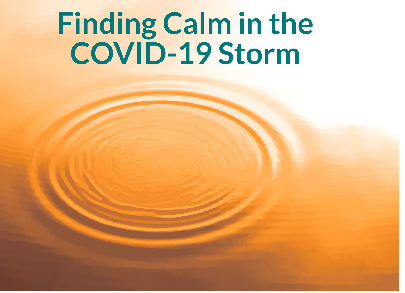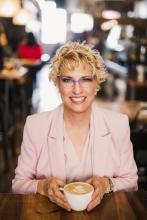Finding Calm in the Middle of the COVID19 Storm When You Have Panic Attacks and Agoraphobia
Finding Calm in the Middle of the COVID19 Storm When You Have Panic Attacks and Agoraphobia

What if you have the kind of anxiety that makes you feel trapped and panicky because of the stay at home orders due to COVID-19? While there are some whose anxiety disorder might find it a relief to have to stay at home and engage in social distancing, there are many for whom this situation creates a special nightmare. This nightmare occurs for several understandable reasons. First, many people with panic disorder feel safer when they know they have easy access to emotional support and physical safety. This might mean feeling safer and less likely to panic when they are within close distance to medical facilities, when there are other people in close proximity or when they could easily travel to an area that feels less anxiety provoking. The stay at home and social distancing rules change all of that. The instructions to avoid the emergency room and to always call your doctor first before making a live appearance changes that. The knowledge that you will be turned away from a medical center unless you are critically ill also changes all of that. Suddenly all of the potentially supports that made it possible to function are no longer available. You cannot even see your therapist in person, which is another challenge.
Additionally, most people with panic disorder and agoraphobia find any mention of physical symptoms, especially to do with the the heart or breathing to be anxiety provoking because it reminds them of their panic attack symptoms. The same is true for hearing words that remind you of your other fears, like being alone without a ready way to get help, words such as “quarantine” and “social distancing.” If you are one of these people, then it could mean that you encounter trigger words all day.
Lastly, the general public mood of anxiety and uncertainty about the future is a special challenge for panickers. People who have anxiety disorders often find that their ability to feel empathy (noticing and feeling the emotions of others) is challenging when they detect anxiety is other people. We know that if you have panic disorder and agoraphobia, you body misinterprets the physical sensations associated with anxiety and stress something alarming. Your brain cannot tell the difference between imagined fear, such as empathizing with someone else who feels anxious, or feeling scared while watching a tense scene in a movie, and a real danger. That means that when you encounter alarming media stories and headlines your body is more likely to feel anxiety that builds into a panic attack. It means that if you listen to people who are expressing their worry and panic, then you will be more likely to feel anxiety that builds into a panic attack.
Here is what you can do to help mitigate the tendency of your body and brain to push into panic during this challenging time:
- Reframe your increased symptoms as your body’s typical and accidental response to mass hysteria, sudden restrictions on lifestyle and your ability to be sensitive and empathize with your fellow humans.
- Radically decrease your exposure to anxiety-provoking media and conversations. Do not pay attention to the “COVID count” and ask your friends and family to refrain from these type of discussions or sharing their most frightening information.
- Make time to slow your body down by using meditation, relaxation, diaphragmatic breathing, relaxation yoga, or prayer. Your body needs help being reminded that it can ratchet down to a resting state so it can get out of alarm mode. Do this when you wake up and then twice more throughout the day. Your goal is to keep your body from getting stuck in perpetual high idle mode.
- When you feel a panic attack beginning, breathe slowly and gently through your nose while keeping your mouth closed. Breathe so gently that you can barely feel the breath moving in the back of your throat and there is no audible sound of inhaling or exhaling. This will decrease the amount of carbon dioxide you over exhale during a panic attack and help to reduce your physical symptoms of panic. You can also use this same technique after a panic attack begins. If you cannot slow down your breathing, you can also breathe in and out as slowly as possible into your cupped hands or a paper bag to help raise the carbon dioxide level in your blood.
- Remind yourself that your panic attack is a false alarm. It may feel awful, but nothing bad is happening to your body. Panic attacks are physically harmless and do not increase the risk of heart attack, stroke or going insane. A typical symptom of an anxiety attack, however, is the feeling that you might be having a heart attack, a stroke, loss of control or loss of sanity. A panic attack is like your body’s way of being the not so funny kid who surprise pops a balloon behind you to try and make you jump.
- Join a free online support group so you can get peer support for coping and to normalize the difficulty of suddenly having to adapt to the COVID-19 stay at home lifestyle. You will find that you are not alone and are likely to get some great tips for coping.
If you feel you cannot manage, get help. You do not have to continue to suffer. Therapists and psychiatrists can provide evaluations and therapy using videoconferencing. Check out the ADAA Find a Therapist directory to find someone who can help you overcome your increase in anxiety.












